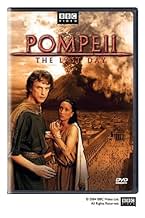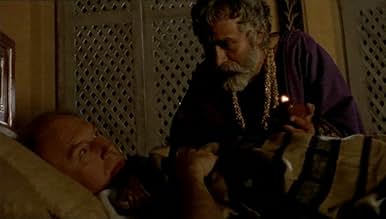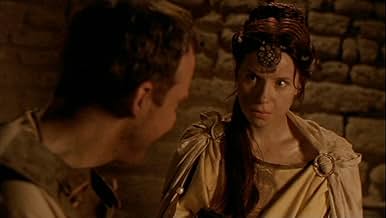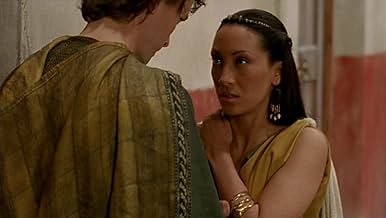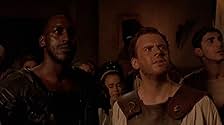VALUTAZIONE IMDb
7,1/10
1059
LA TUA VALUTAZIONE
Aggiungi una trama nella tua linguaA dramatized recreation of the destruction of Pompeii and Herculaneum when Mount Vesuvius erupted in 79 AD.A dramatized recreation of the destruction of Pompeii and Herculaneum when Mount Vesuvius erupted in 79 AD.A dramatized recreation of the destruction of Pompeii and Herculaneum when Mount Vesuvius erupted in 79 AD.
- Regia
- Sceneggiatura
- Star
- Vincitore di 1 Primetime Emmy
- 1 vittoria e 1 candidatura in totale
Alisdair Simpson
- Narrator
- (UK version)
- (voce)
Rebecca Norton
- Fortunata
- (as Rebecca Clarke)
George Antoni
- Felix
- (as George Yiasoumi)
F. Murray Abraham
- Narrator
- (US version)
- (voce)
Tony Amendola
- Pomponianus
- (non citato nei titoli originali)
Omar Berdouni
- Callistus
- (non citato nei titoli originali)
Emily Canfor-Dumas
- Slave Girl
- (non citato nei titoli originali)
Recensioni in evidenza
The dramatised documentary of Pompeii was not that great. The special effects were good, although some things didn't quite happen as it did. Besides the effects of the volcanic eruption itself that others have gone into, and I won't even comment on, the rest was just more propaganda than telling a historic tale.
It was unfair of the BBC to portray one of the dead Pompeii victims as a horrid bad man. It left a nasty taste in my mouth and that was enough for me. The character Stephanus the Fuller may have been a really nice and kind man but this drama turned him into the villain. I'm not sure how they can really make things like that and be given so many awards.
This television documentary showcases a few examples of stories of the people of Pompeii during its last hours and follows these people through to their deaths, combining past and present. It follows the story of gladiators, a tradesman (who owns the equal of today's laundrette), that tradesman's wife, and a politician and his family (including his slaves). It just gives a little bit of life to the different roles that people would have played.
I have always thought that a full-length movie about Pompeii would be nice. it would be an excellent disaster movie, and I think a lot could be done in this aspect.
I have always thought that a full-length movie about Pompeii would be nice. it would be an excellent disaster movie, and I think a lot could be done in this aspect.
I've seen many documentaries but few have gripped me as this one did. The combination of live action, computer graphics, and scholarly voice-over made it a compelling picture. Unlike many feature films, I didn't even look at the clock to see when it would be over.
The only drawback for me was that some of the science went by a little too quickly. I got the general idea of "the column collapses" but would have liked it to be explored a little more in order to have a more comprehensive view.
The inclusion of artifacts was especially moving, particularly when paired with imagined scenes. Overall this is a great documentary -- we could use more like it!
The only drawback for me was that some of the science went by a little too quickly. I got the general idea of "the column collapses" but would have liked it to be explored a little more in order to have a more comprehensive view.
The inclusion of artifacts was especially moving, particularly when paired with imagined scenes. Overall this is a great documentary -- we could use more like it!
The first thing I ever really learned about the Roman Empire was about the eruption of Mount Vesuvius in AD79. I was in Grade 4 or 5 at the time, and read a book (I don't remember the title) that described Pompeii's last day from the perspective of a young boy in the city. The book drew me into the events and gave me a lifelong curiosity about the eruption and the people who experienced it. This superb BBC documentary takes on the same challenge - and pulls it off spectacularly. With a narration that offers a lot of important historical and scientific information combined with some excellent dramatic recreations of the events, which include graphic descriptions of the horrific ways in which some people died, and with archaeological footage mixed in especially near the end (the body casts and skeletons that have been found are such poignant reminders of the fact that real people suffered and died in this cataclysm) this production is absolutely fascinating, and anyone with even a remote interest in what happened on August 24 AD79 should take the time to watch this.
About the only criticism I would make is of a perhaps overly dramatic end. Noting that 3 million people now live in the area surrounding Vesuvius, the narration notes that such eruptions occur about every two thousand years - meaning the time is ripe for another. I've actually come across nothing suggesting such a specific timetable, and suspect that was included just to heighten the drama as the program came to its end. If so, it wasn't necessary. Vesuvius may well erupt again. I know the Italian government actually keeps a close watch on it and has evacuation plans ready for the region if need be. But even if it never erupts again, the eruption of AD79 and the ensuing nightmare it threw so many into will never be forgotten.
About the only criticism I would make is of a perhaps overly dramatic end. Noting that 3 million people now live in the area surrounding Vesuvius, the narration notes that such eruptions occur about every two thousand years - meaning the time is ripe for another. I've actually come across nothing suggesting such a specific timetable, and suspect that was included just to heighten the drama as the program came to its end. If so, it wasn't necessary. Vesuvius may well erupt again. I know the Italian government actually keeps a close watch on it and has evacuation plans ready for the region if need be. But even if it never erupts again, the eruption of AD79 and the ensuing nightmare it threw so many into will never be forgotten.
By far this was the best documentary that l ever saw, Pompeii always invoked my attention since my school days, the unsurprised BBC made a masterpiece blending dramatization with scenes shot at Pompeii rediscovered, each single building on every corner were introduced on a smart narrative, all this was supplied by an priceless gift from the eyewitness called Plinius the younger who wrote all happenings on that day in a book on smallest details, which nobody took it seriously due the newest and weird info on unprecedented scale over the facts, also the Vesuvius and their pumice stone that buried the city, miraculously preserves all remaining buildings, paintings, graffiti art, which allowed to archeologists a best understanding over the Roman Empire, due all others surviving cities already change the whole ancient complex, extremely and highly recommended for those who really want to learn more over the most powerful empire on Earth ever had !!
Resume:
First watch: 2010 / How many: 2 / Source: DVD / Rating: 10
Resume:
First watch: 2010 / How many: 2 / Source: DVD / Rating: 10
Lo sapevi?
- QuizThe film takes place from August 24 to August 25, 79 AD.
- BlooperAs the second-last pyroclastic wave stops just outside the city, the carbon dioxide it sends into the city should have affected all the lamps, dimming if not extinguishing the flames. The flames are untouched although the people are choking.
- Citazioni
Alisdair Simpson - Narrator: The people of Pompeii have never seen anything like this before. There is no word in Latin for 'volcano."
- ConnessioniEdited into I Shouldn't Be Alive: Alone in the Amazon (2010)
I più visti
Accedi per valutare e creare un elenco di titoli salvati per ottenere consigli personalizzati
Dettagli
- Data di uscita
- Paesi di origine
- Sito ufficiale
- Lingua
- Celebre anche come
- Pompeii: The Last Day
- Luoghi delle riprese
- Aziende produttrici
- Vedi altri crediti dell’azienda su IMDbPro
Contribuisci a questa pagina
Suggerisci una modifica o aggiungi i contenuti mancanti

Divario superiore
By what name was L'ultimo giorno di Pompei (2003) officially released in India in English?
Rispondi
